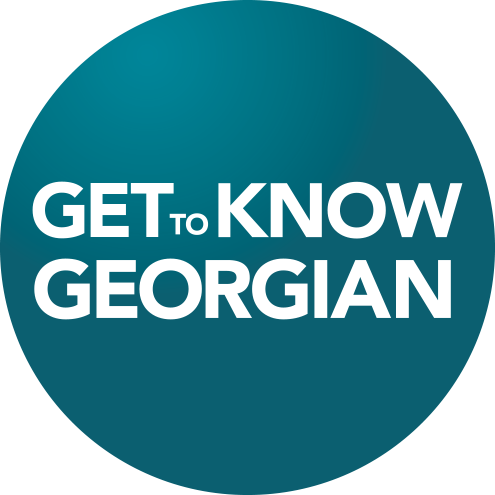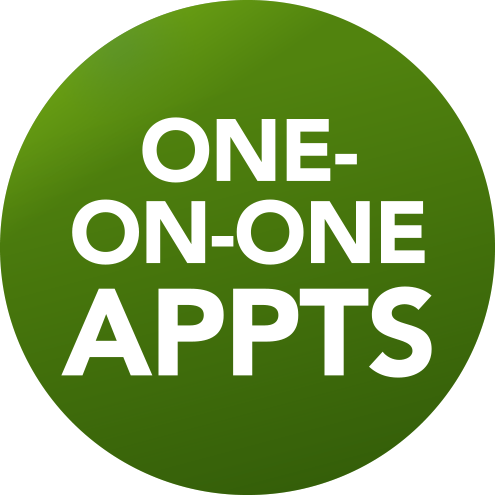
Kick start your career in big data and business intelligence
Big Data Analytics Ontario College Graduate Certificate program
Tell the story behind the information! This major growth area for applied research has been called the “sexiest job of the 21st century.”
Part-time
Program information
Program description
Big Data allows users to visualize past, present, and future patterns by linking and presenting information in meaningful ways. Data Analytics offers deeper insight into the meaning of data sets by telling the story behind the information. This enables stakeholders to make more informed decisions, predict trends and better understand the needs and sentiments of customers. This program provides students with a unique blend of theoretical knowledge and applied skills. Students learn how to collect, curate, manipulate, encode, and store data sets so they can be analyzed and mined in such a� way that they can be reused and repurposed to solve present challenges as well as those that do not yet exist.
Intake information
| Start date | Campus |
|---|---|
| Fall 2025 | Barrie |
| Winter 2026 | Barrie |
| Summer 2026 | Barrie |
Tuition and fees
- Visit our tuition and fees page for detailed information on the cost to attend Georgian.
- Review additional program-specific fees for this program.
- You can afford this! Explore OSAP as well as awards, scholarships and bursaries to help you pay your way to graduation.
What are the admission requirements for the Big Data Analytics program?
Big Data Analytics admission requirements
- Ontario College Diploma, Ontario College Advanced Diploma, Degree, or equivalent. It is recommended that the applicant have a specialty in science, technology, engineering, mathematics, or business.
Additional information
To be successful in this program, students are required to have a personal notebook computer (either PC or Mac architecture) prior to the start of the program that meets or exceeds the following hardware specifications:
- Intel i7 processor or AMD equivalent
- Dedicated graphics card/processor
- 16GiB of memory (32GiB recommended)
- 500GB hard drive (SSD recommended)
What career paths can I take in big data analytics?
Your Big Data Analytics graduate certificate gives you many career opportunities
Graduates of this program are able to collect, organize and correlate data for a wide range of industries including government, applied research, human resources, health care, and sales and marketing. Leveraging prior background, skills and experience, students may be employed in roles such as Data Analyst, Business Analyst, BI Developer, ETL Developer, Database Developer, NoSQL Developer, Data Visualization Developer, Business Intelligence (BI) Specialist, Analytics Specialist, BI Solutions Architect, or Business Analytic Specialist.
Why study Big Data Analytics at Georgian?
The right time
Be among the first graduates in this dynamic and growing field of research.
The right mix of skills
Learn the mix of technical, business and communications skills you need to succeed.
The right experiences
Get the most from your education with our applied learning model, providing you with experience in working with organizations to help them solve real challenges in the community.
The right connections
Benefit from the connections you’ll make with employers and expert faculty from the research analyst, computer studies and business faculties.
The right place
Join the only college graduate certificate program in Big Data. Enjoy a collegial atmosphere, caring faculty and a nice campus setting in a small city with a reasonable cost of living and great quality of life.
Flex MORE. Study Big Data Analytics part-time
Benefits of studying part-time:
What you need to know:
Next steps:
What courses are included in the Big Data Analytics graduate certificate program?
Course overview
12 Program Courses
Program-specific courses
Semester 1 courses are listed below. For a full list of courses in the program including course descriptions, view the Big Data Analytics program outline.
- BDAT 1002 – Data System Architecture
- BDAT 1003 – Business Processes and Modelling
- BDAT 1004 – Data Analytics Programming
- BDAT 1005 – Mathematics for Data Analytics
- BDAT 1006 – Data Visualization
- BDAT 1010 – Business Intelligence
Your course delivery method(s)
GC Flex
This program is delivered via GC Flex, giving you choice and flexibility. Using technology-enabled, purpose-designed learning spaces, professors deliver lectures and labs in the classroom and simultaneously online. You can participate on campus or online during class or review course materials online later.
Please note, delivery methods are based on planning for the upcoming semester and are subject to change.
Frequently asked questions (FAQs)
Big data analytics has been dubbed “the sexiest job of the 21st century” according to a 2012 article published in the Harvard Business Review.
An analysis of labour market trends conducted by the Information and Communications Technology Council of Canada in 2015 suggests that one in five new data-related jobs will involve a big data component, and that the number of people employed in big data analytics will increase by 29 per cent (from 33,600 to 43,300) between 2016 and 2020 alone.
There are currently more than 400 open positions for “data scientists” in the Toronto area alone, with more than 900 positions available across Canada. Under the broader category of “data analyst,” these numbers increase to 1,200 and 2,500 respectively.
Simply put, big data analytics refers to the process of extracting meaningful insights that support decision-making by examining very large and complex sets of data. One of the main things that set big data analytics apart from other forms of analysis is sheer size of the datasets being examined. Big data also can exist in different formats (e.g., a mix of text, numeric, and video data) or in different places (e.g., separate technologies, systems, or databases)*. So here, we are talking about datasets that are as large and complex as to be impossible to examine in an efficient and meaningful way without the application of technologies, as well as the knowledge and expertise to use those technologies and interpret the results in an effective way. This is where the expertise of a person trained in big data analytics comes in.
*SAS (n.d.), Big Data: What it is and why it matters; and IBM (n.d.), What is Big Data?
There are many examples, but here’s just a few:
- In the energy sector, the Weather Company is currently using big data analytics to help utility company managers better predict, plan for, and respond to weather-related risks to infrastructure assets, thereby improving efficiency and delivering better service to customers.*
- In the health care sector, big data analytics is being used to help sequence and analyze genomes to assist in the fight against cancer, infections, and non-communicable diseases, as well as to analyze clinical datasets to understand the cost effectiveness of new drugs and treatments.**
- In the entertainment sector, companies like Disney are using big data analytics to track consumer behaviour on websites and on site to improve service offerings, efficiency, and profits.***
Big data is also being used in manufacturing (e.g., quality control analysis), engineering (e.g., structural stress analysis), marketing (e.g. social media brand perception analysis), agriculture (e.g., crop analysis), information management (e.g., digitized, searchable archival records), and many other sectors.
*Hertell, B. (2016), How analytics is helping utility companies weather storms.
**Canadian Health Infoway (2013), Big Data Analytics in Health.
***Coyne, E.M. (2015), The Disney take on the value of big data. For other examples, see Cloudera (2011), Ten common Hadoopable problems
Analysts working in the field of big data use a mix of business knowledge, analytical abilities, technical expertise, and communication skills to collect, interpret and communicate findings from the analysis of big data to support decision-making, often within organizations. Many analysts work for larger business and government organizations (with large datasets to analyze and the resources to do it), though opportunities also exist in smaller technology-based companies or business consultancies.
Their day-to-day work can involve working independently (as technical experts), as well as in teams (supporting projects involving different parts of an
organization).
Typical job titles include data scientist, data engineer, business intelligence specialist, and information systems officer, among others. As their career progresses, big data analysts also may advance into higher level roles as project managers, directors, or beyond.
Employers have been clear* that in hiring a big data analyst, they are looking for a combination of business, technical, and people skills. Learning the basics of SQL or Hadoop online is not enough. They want people who know about the industry environment they are working in, the types of data they have, and the information that would be of greatest value to them. They also want people with a demonstrated ability to work with diverse stakeholders to collect and analyze the information, and then to distill and communicate the findings in a clear and succinct way to create actionable insights for their organization.
*Based on input from the program advisory board, faculty members and other industry professionals
Georgian College has launched a one-year graduate certificate in big data analytics, designed to equip students with the right mix of technical, business, and communications skills to launch a career in this field. Taught by faculty from the Computer Studies, Business and Research Analyst programs, the program builds on Georgian’s established record of providing real-world, applied learning opportunities that equip students with the skills, experiences, and connections they need to succeed in new careers.
The program includes courses on data manipulation (e.g., editing datasets), information encoding standards (e.g., migrating and/or synchronizing data to combine different datasets), business processing modelling (e.g., understanding how data is used to support decisions in different types of organizational contexts), mathematics for data analytics (e.g., using statistics for predictive analytics), data visualization (e.g., understanding how to interpret and present the results of data analytics), among other related subjects. As part of the course of studies, students will work on real data with real-world clients, culminating in the completion of a big data analytics project in which they will design, develop and implement a big data analytics research project to fulfil a real organizational or community need.
It helps to have some background in that, but you don’t need to be an expert. That’s what we’re here for! Our program is designed in a way that will help people with limited backgrounds in math and computer programming to increase their expertise from the foundations to more advanced methods and applications. Moreover, not all roles in big data involve extensive use of advanced statistics and computer programming. Some are more geared towards data collection and information management, project management, and data visualization, while many analytics programs are moving more towards point-and-click interfaces.
The Big Data Analytics program was developed based on input from leaders in industry, academia, and government. We know it is designed to provide people with skills that are in high demand. There are currently more than 1,200 open positions for data analysts in the Toronto area alone posted to LinkedIn, with more than 2,600 positions available across Canada. Other related search terms such as “data scientist” and “data engineer” reveal many more. According to payscale.com, the median salary for data analysts (an entry-level position) is about $52,000 per year, while those in positions such as senior
data analyst or data scientist have a median salary around $69,000 and $71,000 per year, respectively. Those in more senior positions such as analytics manager, director of information systems, and chief information officer have median salaries ranging between $80,000 and $138,000 per year.
Check out our other related programs
Computer Programming
Learn to code using in-demand programming languages. Design and build applications for desktop, mobile and web. Be job-ready in two years.
Cybersecurity
Focus on practical information security topics and strategies. Benefit from field trips and industry guest speakers. Get hands-on experience on your co-op work term.
Project Management – Information Technology
Build job-ready skills to plan, manage and deliver information technology projects in today’s fast-paced world
Research Analyst
Learn from expert faculty and gain hands-on experience. Be ready for your exciting career in market, social or public policy research.
Do you have questions about Big Data Analytics? Contact us!
Thinking about applying to Georgian?
Contact our student recruitment team to explore your study options.
Already applied to Georgian?
Connect with the Office of the Registrar for admissions-related questions.
Are you an international student?
Contact our international recruitment team to learn more about studying at Georgian.
Ways to connect

Attend a GTKG virtual info. session on July 8th, and Aug. 12th
Register for an upcoming session
Take a guided, in-person tour
of our campuses.
Book a campus tour.
Book a phone appointment
with a recruitment specialist.
Connect with a recruiter.
Join our email list for event updates, contest information and more.
Sign up for Georgian updates.







